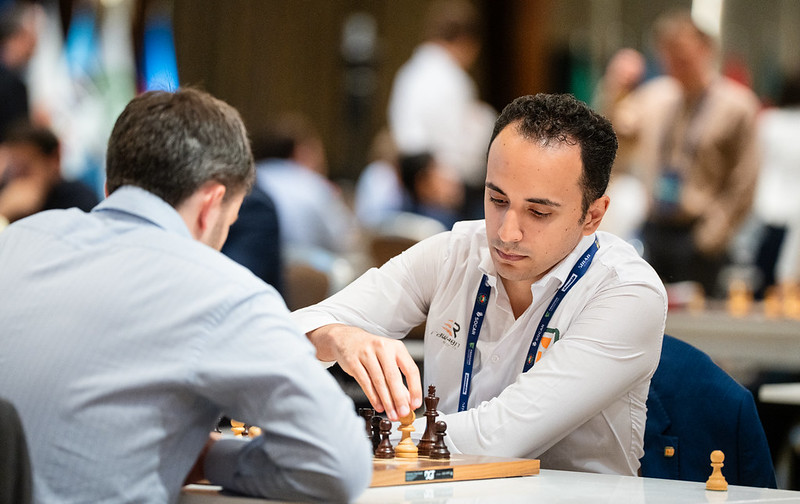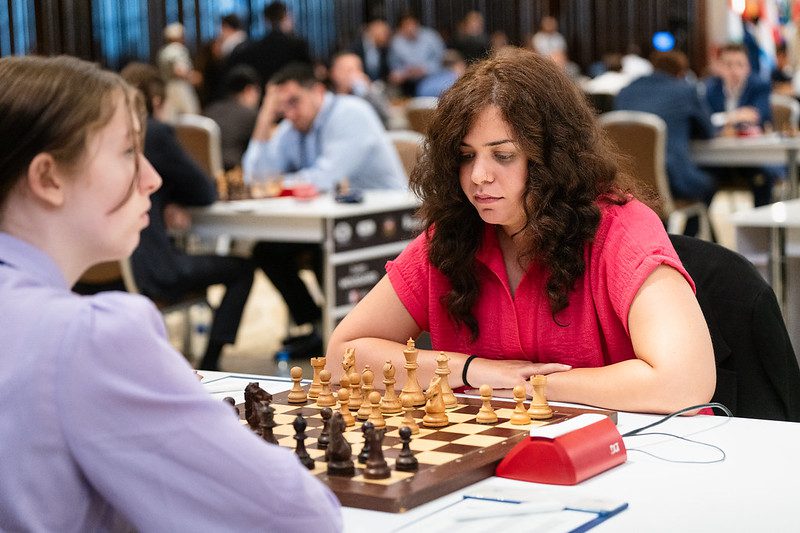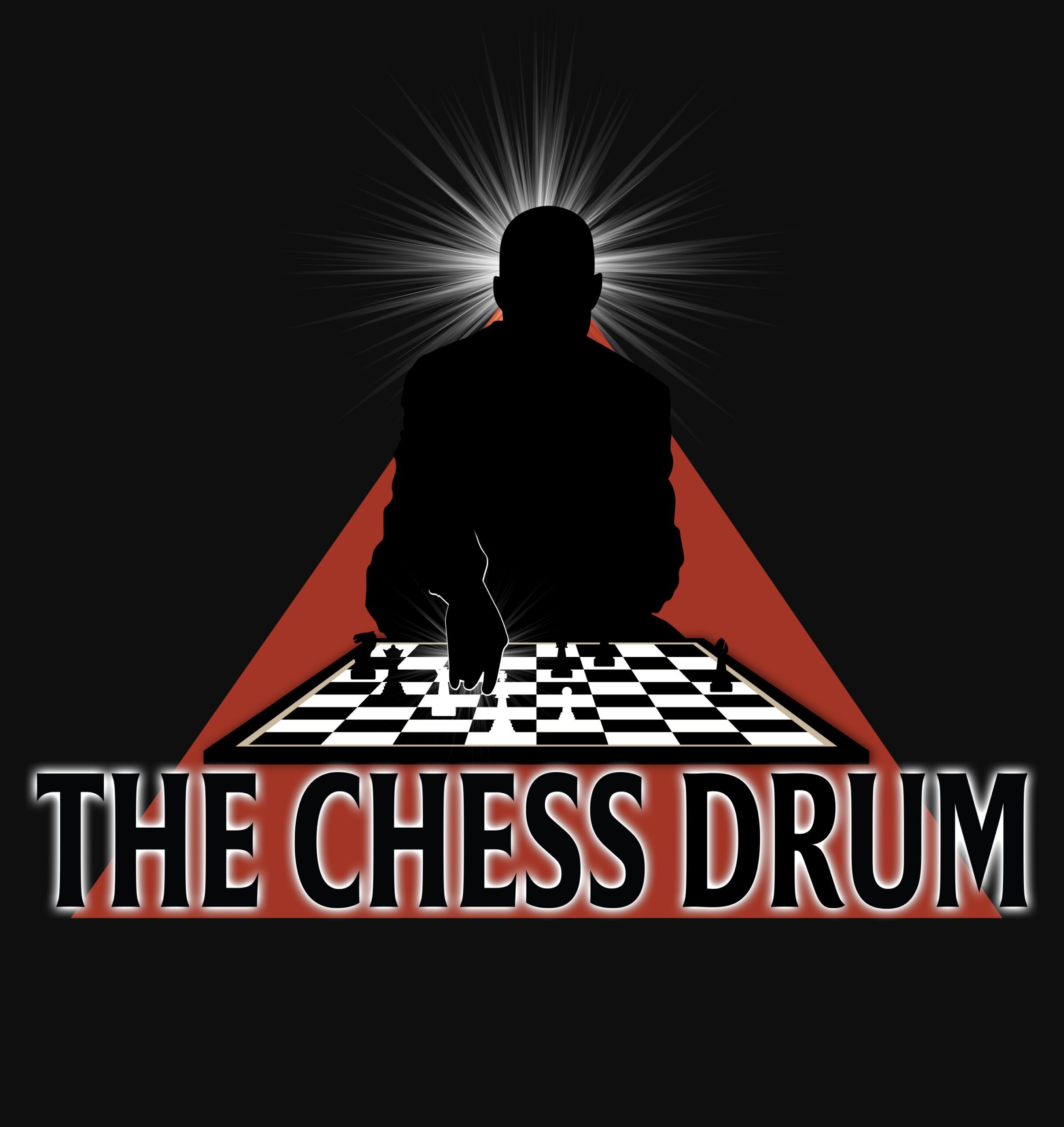After World Cup, Where is African Chess?
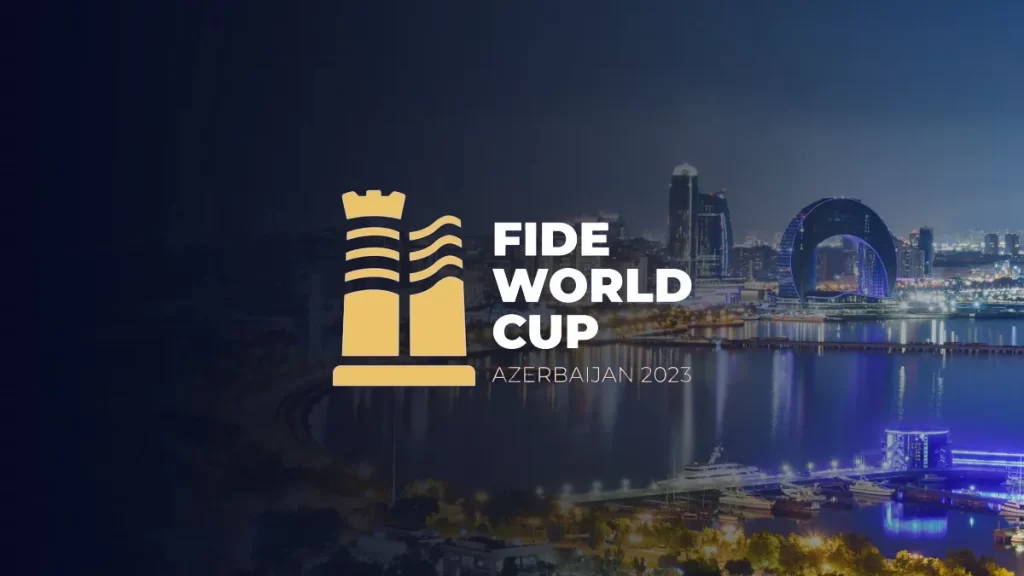
One month ago, African Chess was on display. Twenty-two of Africa’s finest chess players (17 Open and 5 Women) participated in the World Cup tournament in Baku, Azerbaijan. Magnus Carlsen scored a historic victory winning the final over phenom Rameshbabu Praggnanandhaa. The results of the tournament clearly showed that a generation is set to take over and Asian players made a particularly strong impression.
Thus far, the 21st century has belonged to Asian chess. In particular, both China and India have made breakthroughs. Chinese women continue to dominate and the country also holds both the overall and women’s world titles. India has seen a torrent of talent rush to the elite halls of chess and placing four players in the quarterfinals was evidence of that. Uzbekistan and Kazakhstan have also shined. Many are wondering when the African continent will make a breakthrough.
“Africa cannot replicate the old Soviet Union, the United States’ “Fischer Boom,” or the current wave in Asia, but it can have a Pan-African chess movement of its own.”
Africans in World Cups
Over the years, The Chess Drum has covered African chess with specific emphasis on its top events such as the African Individual Championships. From this tournament, the qualifiers for the World Chess Cup are taken. This is a great opportunity for African players who are mostly not professional and have few chances to show their skill at the highest level.
If we go back to the year 2001 when South African International Master Watu Kobese delivered a shocking loss to Peter Leko (2739) to force tiebreaks. Egyptian International Master Fouad El-Taher would defeat Kiril Georgiev of Bulgaria (2686). Both would go on to lose their matches, but it was obvious that African representatives were not satisfied with a chess vacation and a modest remuneration. (link)
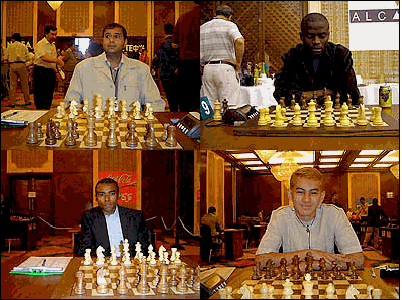
GM Hichem Hamdouchi (Morocco), IM Amon Simutowe (Zambia),
IM Ahmed Adly (Egypt) and IM-elect Kenny Solomon (South Africa). All are now Grandmasters.
The recently-concluded event in 2023, we will find that only two African players have made it past the second round, Hichem Hamdouchi in 2004 (beating Alexander Motylev and Sergey Kudrin) and Bassem Amin making it round three in 2021 and 2023. There have been a number of draw upsets such as Arthur Ssegwanyi holding Anish Giri in the first game in 2015.
2023 World Cup
The tournament in Baku, Azerbaijan was headlined by Carlsen, but in the revised format, the top seeds players would get a “bye” and play the winners of round 1. It is an improved version since it would give lower seeds more of a chance to advance. Since 2021, there has been a twist in that the top 100 federations get to nominate a representative. Thus, Africa had more than the usual qualifiers from the African Championships.
There were no breakthroughs as only three African players went to tiebreaks. Ahmed Adly, who was eliminated by compatriot Abdelrahman Hesham in 2021, advanced to the next round. Amin received a bye to round 2 giving his rating. For the second consecutive World Cup, more than one African player moved on to the second round.
Africans at World Chess CupJuly 29th-August 25th, 2023 (Baku, Azerbaijan) |
|||||||
|---|---|---|---|---|---|---|---|
| 1 | Cawdery, IM Daniel (2388) |
 |
RSA | Henriquez Villagra, GM Cristobal (2618) |
  |
CHI | |
| 2 | Fawzy, GM Adham (2533) |
           |
EGY | Supi, GM Luis Paulo (2582) |
   |
BRA | |
| 3 | Beukes, IM Dante M (2180) |
  |
NAM | Saric, GM Ivan (2657) |
  |
CRO | |
| 4 | Tissir, GM Mohamed (2347) |
   |
TUN | Kuzubov, GM Yuriy (2628) |
  |
UKR | |
| 5 | Adly, GM Ahmed (2596) |
           |
EGY | Barbosa, Evandro Amorim (2493) |
   |
BRA | |
| 6 | Balogun, FM Oluwafemi Daniel (2235) |
|
NGR | Predke, GM Alexandr (2651) |
   |
SRB | |
| 7 | Hesham, GM Abdelrahman (2414) |
           |
EGY | Bartel, GM Mateusz (2614) |
   |
POL | |
| 8 | Nsubuga, FM Haruna (2223) |
  |
UGA | Moussard, GM Jules (2654) |
    |
FRA | |
| 9 | Wageih, IM Kareim (2369) |
           |
EGY | Ragger, GM Markus (2624) |
  |
AUT | |
| 10 | Oatlhotse, IM Providence (2199) |
  |
BOT | Narayanan, GM S.L. (2656) |
  |
IND | |
| 11 | Makoto, IM Rodwell (2312) |
  |
ZIM | Abasov, GM Nijat (2632) |
  |
AZE | |
| 12 | Mwali, IM Chitumbo (2304) |
  |
ZAM | Yilmaz, GM Mustafa (2639) |
  |
TUR | |
| 13 | Alhassadi, Yousef (2030) |
  |
LBA | Cheperinov, GM Ivan (2663) |
   |
BUL | |
| 14 | Abera, CM Aydagnuhem Gezachew (2121) |
  |
ETH | Saleh, GM Salem (2661) |
  |
UAE | |
| 15 | Rehan Deng, Cypriano (2147) |
  |
SSD | Sindarov, GM Javokhir (2659) |
  |
UZB | |
| 16 | Djabri, Massinas (2231) |
    |
ALG | Fressinet, Laurent (2652) |
    |
FRA | |
| 17 | Zaibi, Amir (2375) |
   |
TUN | Indjic, Aleksandr (2619) |
   |
SRB | |
| 1 | Adly, GM Ahmed (2596) |
           |
EGY | Van Foreest, Jorden (2693) |
    |
NED | |
| 2 | Amin, GM Bassem (2694) |
           |
EGY | Albornoz Cabrera, GM Carlos Daniel |
  |
CUB | |
| 2 | Amin, GM Bassem (2694) |
           |
EGY | Grandelius, Nils (2684) |
  |
SWE | |
|
|
|||||||
From the chart, it may not look like a successful tournament for the Africans. All of the representatives held their flag aloft with dignity and pride. Heavily outrated, all played to the best of their standard, but there were a number of players who punched above their weight and applied pressure. In fact, a survey of the games saw many African players going 50 moves or more.
Both Haruna Nsubuga and Dante Beukes seem to have big chances against their esteemed opponents. Nsubuga had his French opponent on the ropes but had to settle for a draw after 109 moves.
Interesting moment #FIDEWorldCup for African chess. Namibia’s Dante Beukes ?? Uganda’s Haruna Nsubuga ??were better in their games but were ultimately held by more experienced GMs. @AfricaChessConf @thechessdrum
— Daaim Shabazz (@thechessdrum) July 30, 2023
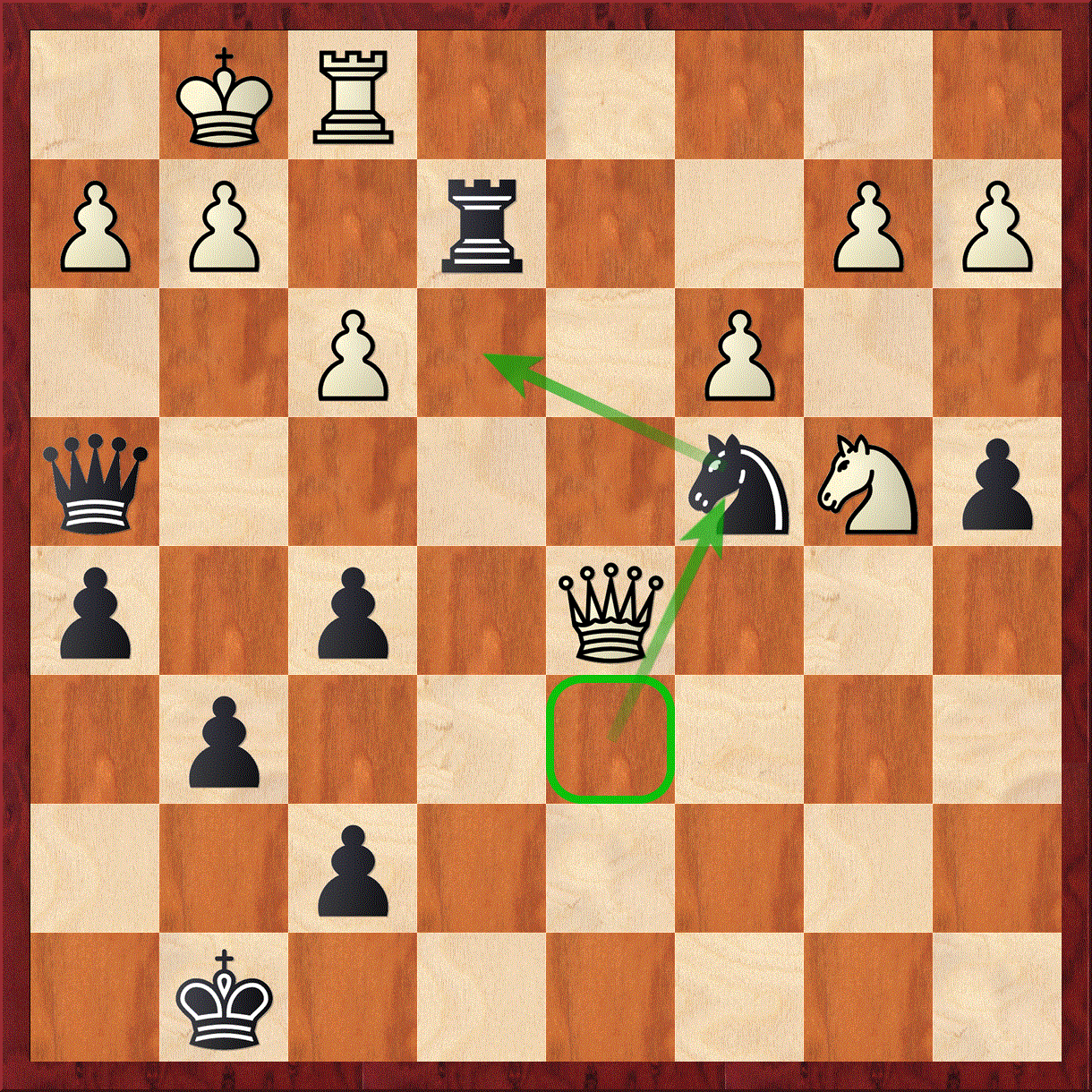

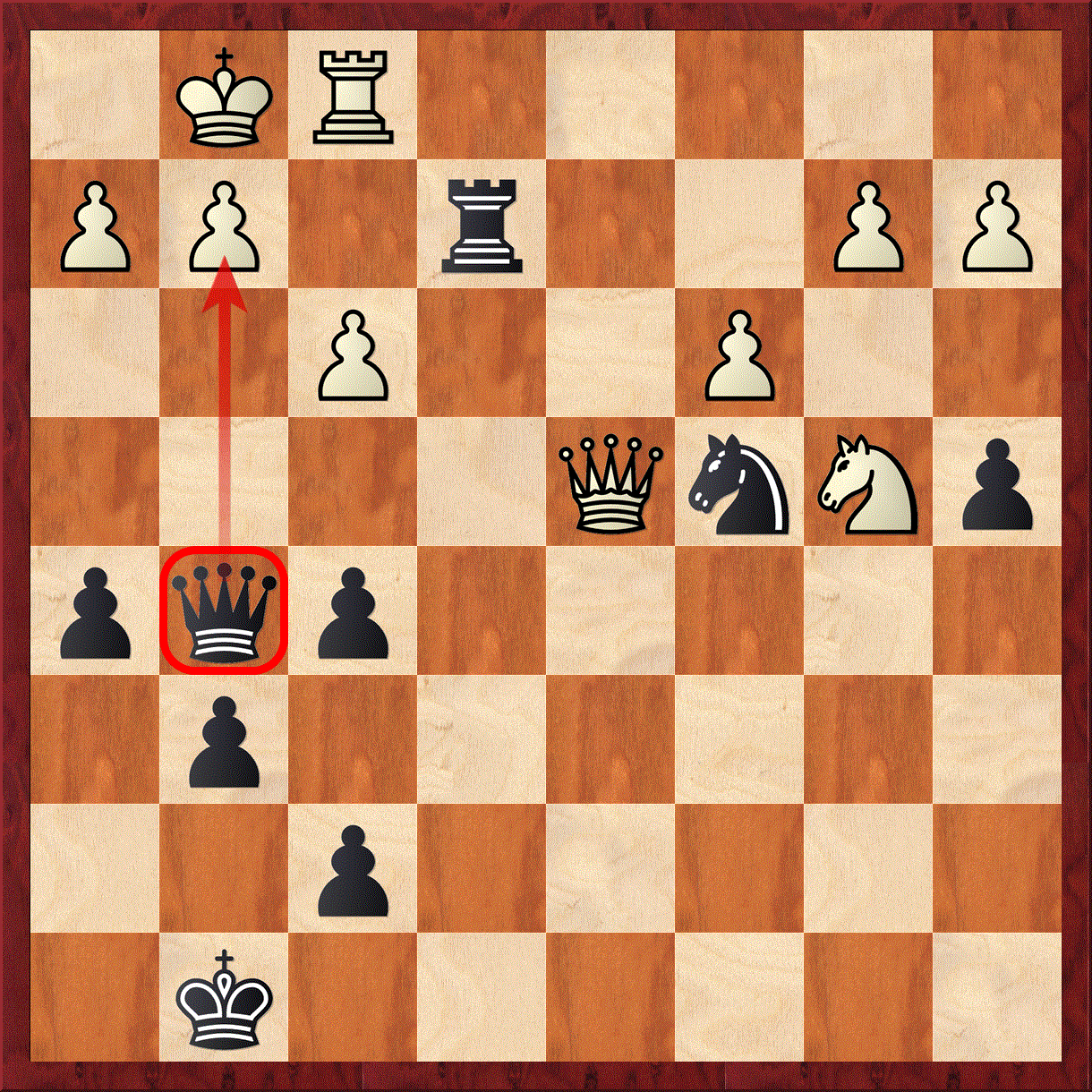

Nsubuga has just played 30…Nc4! and the engine lights up with -+6.79 (Diagram 1) After white’s 31.Qd4, the Ugandan blunders away the direct win by trading queens with 31…Qxd4?? Instead 31…Qg5! would win cleanly. (Diagram 2)
Beukes missed a golden opportunity against the legendary Croatian in a Rauzer Attack. Black has pawns for the exchange, but all are weak or blockaded. Black has just played 56… Kd8 to blockade the passed c-pawn.


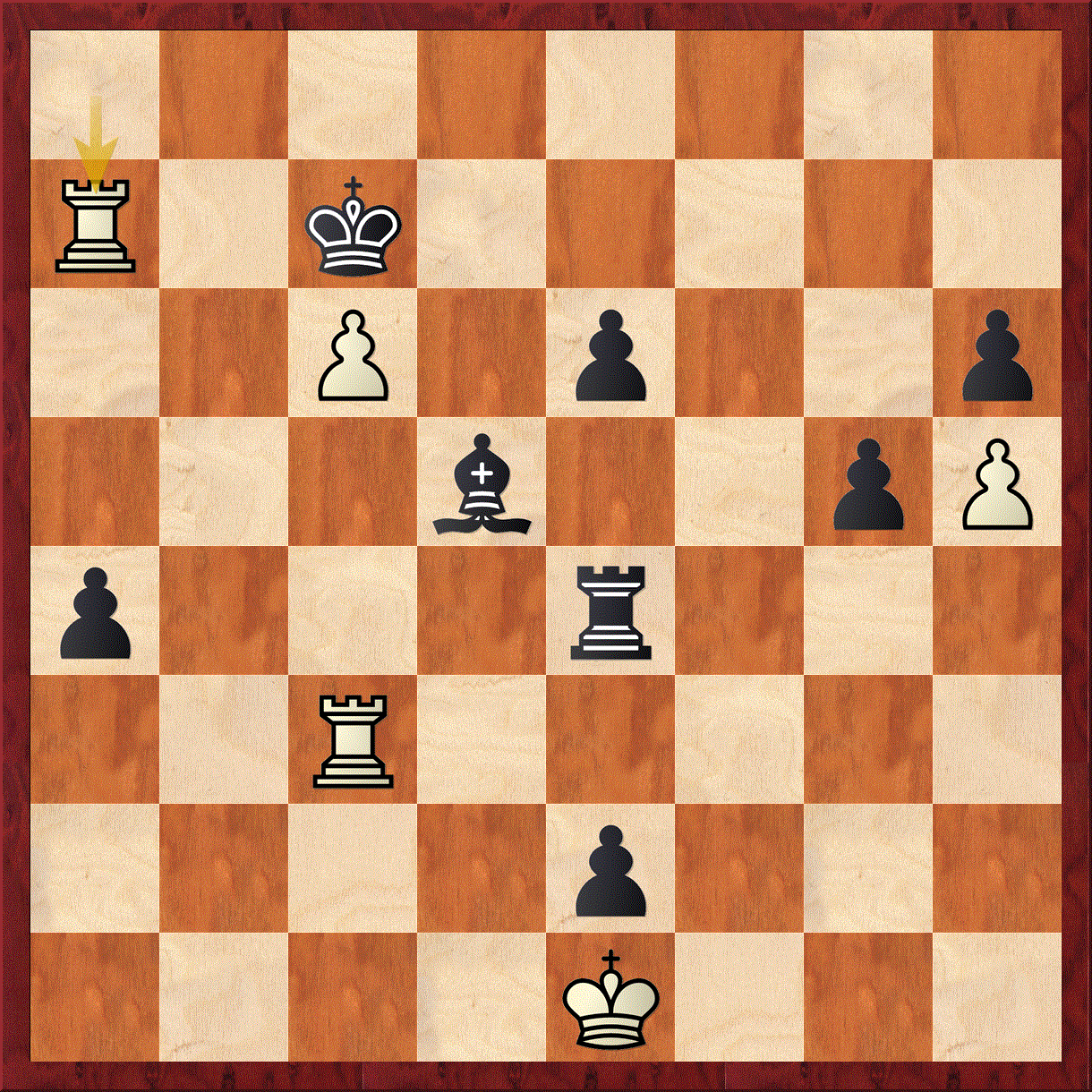

Beukes has totally outplayed the Croatian GM, but time pressure was a factor here. There is no good reason not to eliminate black’s only threat with 57.Kxe2! and white is winning. Beukes played 57.Kf2? losing the initiative. White settled for a three-fold repetition with 64.Ra7+ which Saric was glad to take.
Tunisian Grandmaster Amir Zaibi had a decisive advantage in his game against Serbia’s Aleksandr Indjic.
The fact that there are more African players competing against strong players is going to be a great help in the long run. In general, these opportunities only come every two years at the World Cup and the Olympiad. For the women, there are even fewer events, but that will mean that they play in open tournaments to increase their options. There are a number of programs sprouting and the Gift of Chess has begun to spread its beneficence into a dozen African countries.
Africans at World Chess CupJuly 29th-August 25th, 2023 (Baku, Azerbaijan) |
|||||||
|---|---|---|---|---|---|---|---|
| 1 | Nassr, WGM Lina (2071) |
    |
ALG | Milliet, IM Sophie (2388) |
    |
FRA | |
| 2 | Van Zyl Charlize (1839) |
   |
RSA | Salimova, IM Nurgyul (2409) |
   |
BUL | |
| 3 | Wafa, WGM Shahenda (2093) |
           |
EGY | Narva, IM Mai (2387) |
  |
EST | |
| 4 | Khaled, WGM Mona (2106) |
           |
EGY | Maltsevskaya, IM Aleksandra (2386) |
   |
POL | |
| 5 | Abdi, Zineb Dina (1858) |
    |
ALG | Hoang, GM Thanh Trang |
    |
NED | |
| 1 | Khaled, WGM Mona (2106) |
           |
EGY | Roebers, GM Eline |
    |
NED | |
|
|
|||||||
Which Way Forward?
There is often the question raised about Africa’s participation in events on the world stage. It is good exposure for the players and a larger number are getting a chance to face world-class competition. The word is that African players are woefully underrated due to the lack of opportunities to improve their standard. Due to this hunger for competition, Africans frequently walk away with the scalps of unsuspecting players at Olympiad tournaments. The opposition is no longer as optimistic getting 4-0 scores.
However, is the situation improving in Africa? The short answer is “yes.” There needs to be a unique culture established. Africa cannot replicate the old Soviet Union, the United States’ “Fischer Boom,” or the current wave in Asia, but it can have a Pan-African chess movement of its own. Years ago, I wrote about such a vision in an essay, “Can Pan-Africanism Work in Chess?” Indeed. By the amount of activities in diverse places, there is hope, but the progress is uneven. Thus far, Egypt has led the charge as the strongest country with Bassem Amin as the continent’s top player.
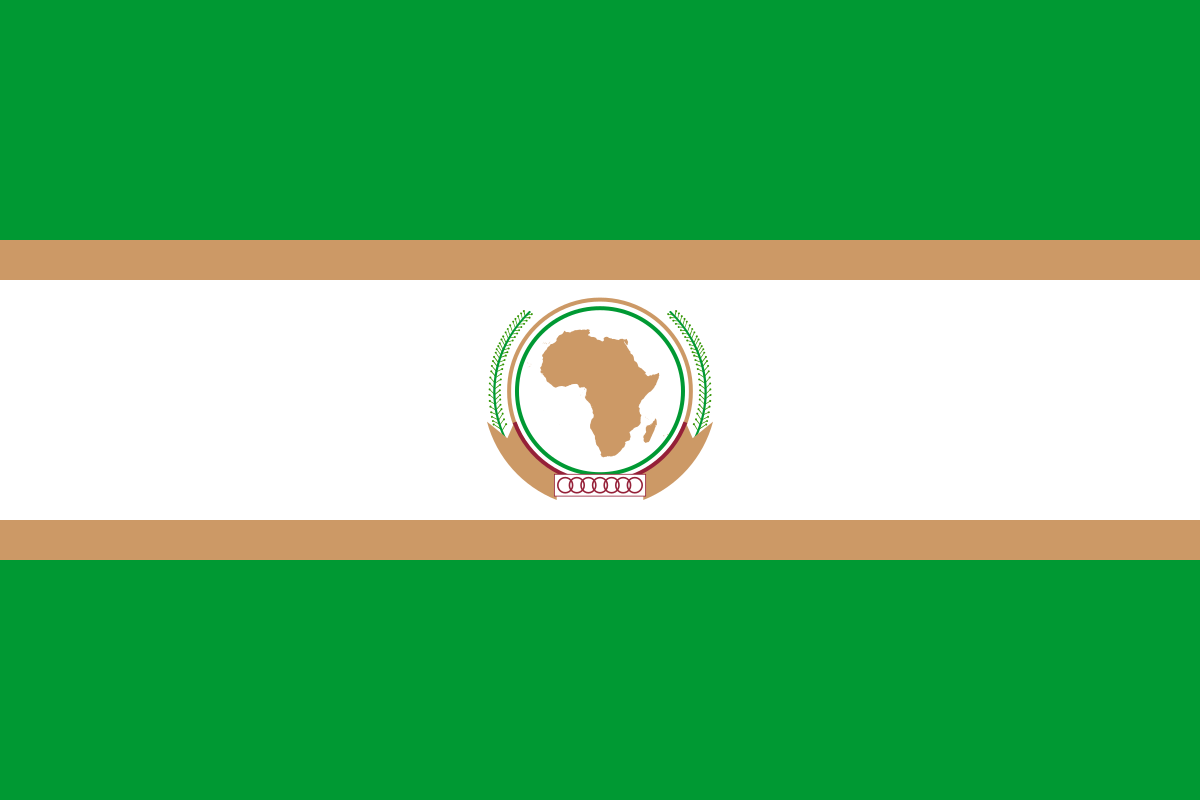

Currently, 53 of the 54 African countries have chess federations. Some have but a few members, while others have visions of their first Grandmaster. It is important that they are retained as active and equal participants in FIDE events and policies. Africa has a very engaging WhatsApp group, but only a few sites providing up-to-date coverage. One problem is the lack of a structure. While a lot of photos are posted, these tend to be within private groups like WhatsApp which has a limited audience.
Nevertheless, WhatsApp has been a good tool of engagement. This platform provides a way for Africans to maintain contact, exchange ideas, and chart a course for the future of chess on the continent. Of course, there is a lot of chatter and sometimes contentious debates, but it is a very positive arena for exchange. The level of engagement may surprise the chess world, but how can this energy be made more public?
Looking Back at Anand’s Visits to Africa
What will be Africa’s plan given that its federations have such a diversity of chess histories? How will these federations get buy-in from local sponsors and government ministries? Is there a guide or model? Five-time world champion Viswanathan Anand has paid several visits to Africa (Kenya, Tanzania, South Africa, and Botswana). No other sitting world champion had visited Africa as part of a goodwill gesture to promote chess in Africa.
At the time, it provided some credibility that chess is a worthwhile investment. Given the current Indian chess boom, it is even more apparent. One of the elements that has spurred the high profile in India is the social media platform branded as ChessBase India. It has filled a void left by Vijay Kumar, who traveled the world covering Anand’s events. It has been eight years since the ChessBase experiment was launched. The initiative has helped to give us a view of the elite talent sprouting in the world’s most populous nation.
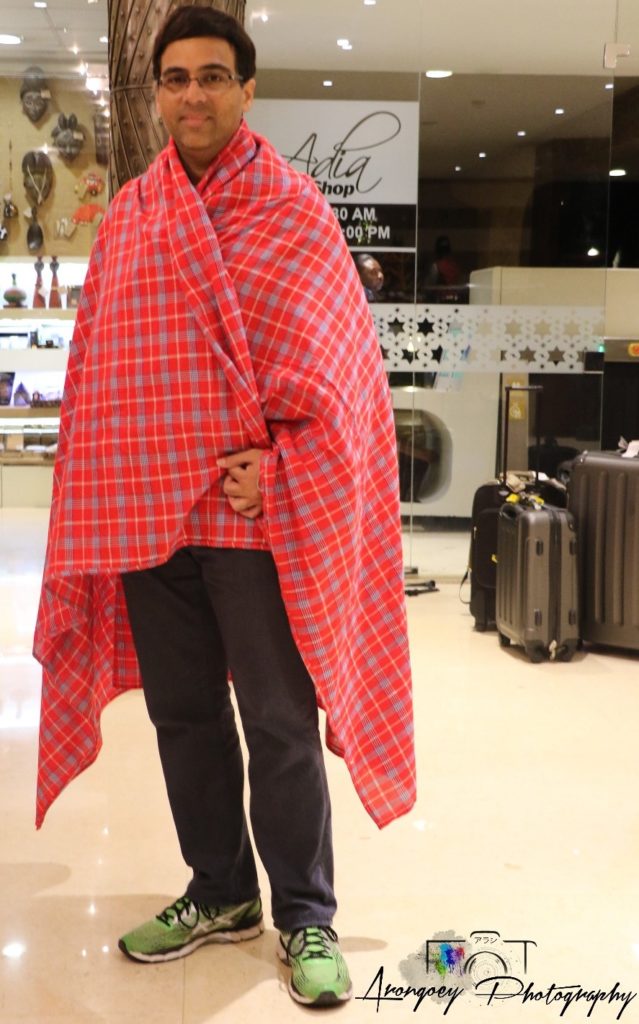

GM Viswanathan Anand with his Maasai “shuka”.
Photo by Allan Victor (Rongoey Photography)
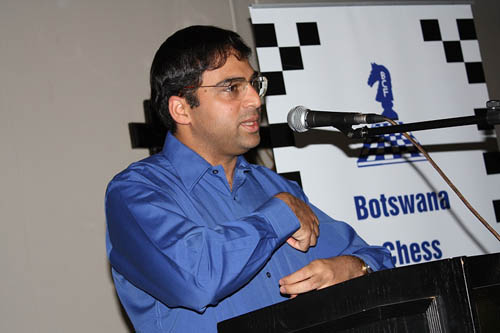

Anand addresses audience at dinner.
Photo by Booster Galesekegwe
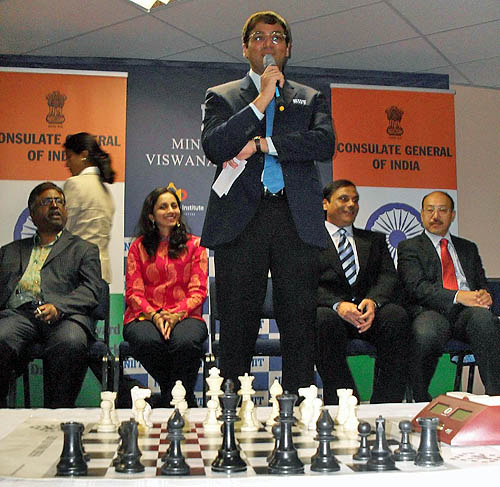

South Africa’s Consulate General of India welcomes the then-World Champion.
Photo by Keith Rust
Anand began visiting Africa, it was during a time when the current crop of Indian juniors was 4-6 years old. In fact, the brightest hope of India at the time was Parimarjan Negi who was 13 years old when he earned his GM title. The revolution had already started. Anand’s trips were apparently sponsored by NIIT, a large Indian multinational. During Anand’s visits, there was very little media exposure and chatter about the visits. In fact, few articles can be found in online archives. The Chess Drum wrote several articles on his visits. Perhaps it was not apparent that Anand was changing the balance of power in chess.
During Anand’s visits to Africa, India was in the process of creating a chess revolution. Pentala Harikrishna and Krishnan Sasikiran were some of the first prodigies to emerge. Currently, you have Vidit Gujrathi followed by a group of teen phenoms taking the world by storm. When Anand made his visit to Africa beginning in 2009, India had 20 Grandmasters. Only 14 years later, they have 83. Apart from the iconic leadership of Anand and the nationwide support, the aggressive marketing has been stellar.
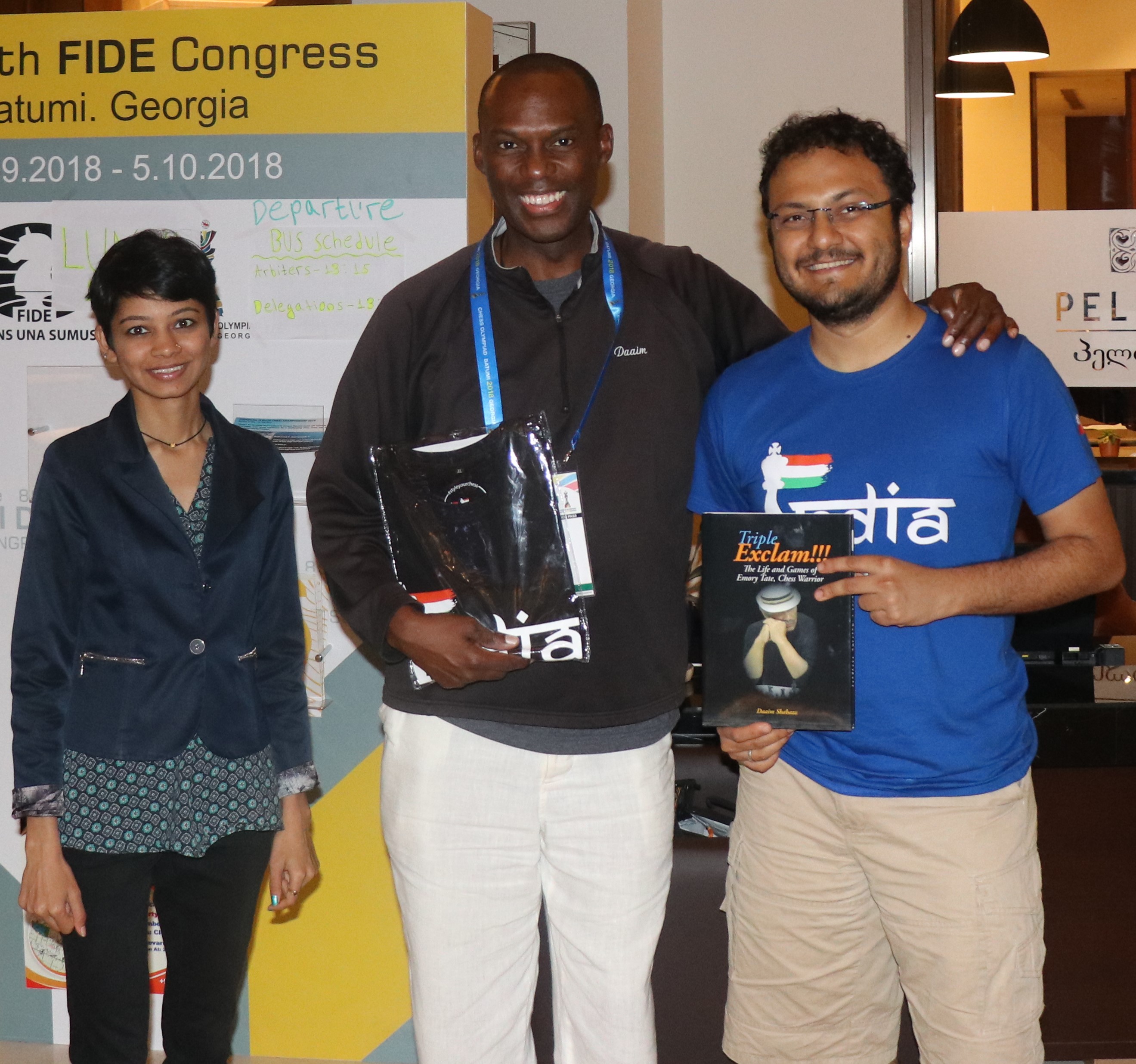

Daaim Shabazz with Amruta Mokal and Sagar Shah
at the 2018 Chess Olympiad in Batumi, Georgia
Photo by Daaim Shabazz/The Chess Drum
Putting an excellent Olympiad together in just a few months shows the level of support given. How do African countries garner such support? There are definitely a few things to learn on the marketing front. While African nations cannot boast of having a world champion, each may have their own local heroes. Who can forget Andrew Kayonde’s pronouncement when playing Vasyl Ivanchuk, “I know he is Ivanchuk, but I’m also the Zambian champion.”
Mobilization of media covering chess activities has to be one of the most important activities to build a culture. There is often a thought of creating a portal similar to what we see in ChessBase India. Sagar Shah and his wife Amruta Mokal run the operation full-time with a small staff and have amassed quality content in terms of viral videos and news coverage of Indian chess. The impact has been tremendous as it provides a platform to showcase talent and perhaps attract sponsorship. They also cover top-level events and even profiled this writer.
While websites like The Chess Drum, Africa Chess Media, Kenya Chess Masala, and Bruvschess, have covered African chess, there needs to be a more concentrated effort. Would privately run ChessBase Africa, or a similar portal, be possible? These conversations are happening, but this would require a mammoth effort. The work would require full-time dedication. It would go a long way in providing a marketing showcase of African chess which would at least show an investment value.
How Can Africa Break Through?
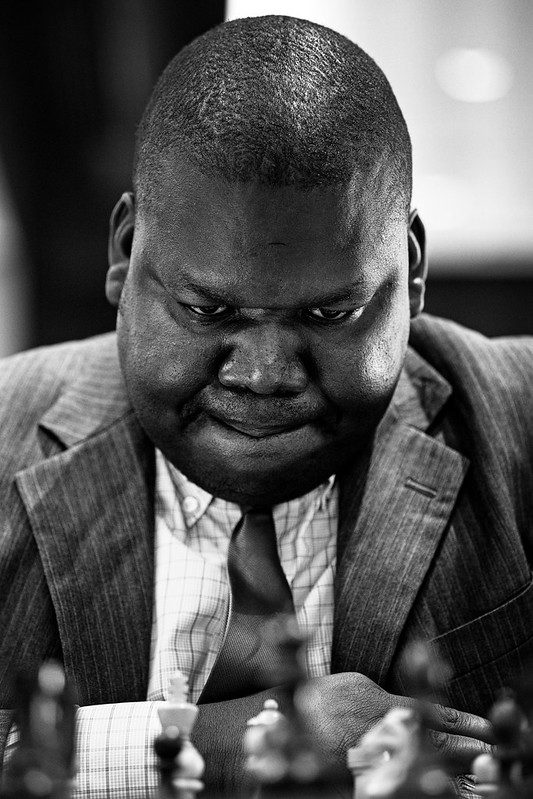

IM Chitumbo Mwali (Zambia)
Photo by Stev Bonhage
There are some initiatives moving across the continent as the Gift of Chess is the latest to spread the passion of chess by donating millions of chess sets. Susan Namangwale is the continent’s director of this effort and thus far, twelve countries have been beneficiaries. While the distribution of equipment is an important step, player development is a bit more challenging. The need to travel abroad for strong competitions makes the task daunting.
When the question is raised of why Africans do not produce more Grandmasters, it has to be taken in the proper context. Some want to imply that Africans are not capable, but given the poor investment and small markets, Africans may have actually exceeded expectations. Many nations with more economic stability have not produced as many titled players as some of the top African federations. While Africa continues to attend Olympiad tournaments in high numbers, it is a challenge every two years to raise funding.
Chess is seen as a non-essential activity that offers little in terms of return on investment of time and financial resources. How does one show the value to society? Spending six hours a day studying chess and traveling thousands of kilometers/miles to possibly get an IM/GM norm doesn’t sound to be a good financial proposition. The typical answer offered has been “Chess-in-Schools” as part of SDG initiatives. However, these programs are not designed as academies to produce elite players but to reach a critical mass with hopes that bright talent will emerge.
FIDE has taken a rather passive approach to chess development in Africa. Of course, there are helpful FIDE seminars to train trainers and arbiters. Getting youth to play chess is wonderful, but what about those who show exceptional talent? Where is the player development? During the 2006 FIDE Presidential election, The Chess Drum interviewed both Kirsan Ilyumzhinov and Bessel Kok about plans for player development. Answers from both 2006 interviews are combined below:
The Chess Drum: There are many talented players around the world who struggle to get invitations and recognition. For example, most did not know of Robert Gwaze (Zimbabwe) until he went 9-0 on board #1 in the 2002 Olympiad in Bled. In addition, South Africa’s Watu Kobese and Zambia’s Amon Simutowe have been top players in Africa for a long time, both pursuing the GM title. In the U.S. I personally know talented U.S. players such as Emory Tate and Stephen Muhammad who are in the same situation. In the Caribbean much of the talent has been untapped. What is your thought of a Grandmaster Developmental Institute to provide financial assistance and training for those identified (by an application process) with the potential to become Grandmasters? Please elaborate.
Kirsan Ilyumzhinov: It’s an interesting idea. But one needs a balance between a natural as opposed to a nurtured grandmaster. If there is a concrete proposal, FIDE might look at it.
Bessel Kok: An important foundation of chess development is the educational program for chess in schools. This will start to widen the base within all developing countries where it may be introduced. The use of internet will also be a massive breakthrough in providing training to aspiring chess players.
Rather than zoom in on GMs we prefer to look at the provision of a platform where any person who wants to take up chess as a profession will have the opportunity to do so but he / she must be professional and competent. This means adequate certification. Another key weakness is the costs normally associated with getting GM or IM titles and this is compounded by a lack of tournaments in developing countries.
The Right Move is offering, as part of its development program, 40 invitations per continent per annum to players covering board, accommodation and tournament expenses in Europe and the United States. The objective is to give players in developing nations a chance to get international experience and norms. These invitations will be discussed with Continental Presidents and allocated on a fair, rotating basis.
TCD: The granting of automatic titles (as opposed to three norms) in Zonal events have been criticized and aimed at zones of developing regions. What is your view on getting automatic titles in Zonal events and do such practices dilute the prestige of chess titles?
Kirsan Ilyumzhinov: This practice is centred on the performance of players who excel during these events. Having set the criteria for the award of these chess titles the prestige will therefore remain intact. This contribution to chess activities in the developing regions is duly appreciated.By the way, this automatic system of awarding titles in zonal events was introduced before my administration – before Campomanes, before Olafsson, before Euwe, during Rogard. During the Rogard years (1949 to 1970), FIDE was made up mainly of European nations – were they considered developing regions? They were the first and main benefactors of the system. FIDE membership doubled only during the Campo years. I repeat – most of the critics of this system were benefactors of the system which was already in place since the 1960’s. Should we agree that Rogard was wrong, Olafsson was lazy to do anything about the mistake, and Euwe was blind? Due to the expansion of FIDE membership during the Campo tenure, the system flourished but I am to blame for diluting the prestige of these titles. I’ve also heard about the rating system. We have expert committees and these members are mainly from the developed world. FIDE does not interfere with their expert recommendations.
Bessel Kok: This idea was introduced around 20 years ago and let us review what it has done for chess in developing nations actually. Has it increased the number of actual players playing? Has it meant more revenue for the national chess Federation? Why are we in such a dire situation in so many nations in Africa and the Americas today? The reason is that just giving a title without a real program for development will get us nowhere.
Most of the top players were in situations where their parents were financially capable of sustaining their child’s goals in chess. This is less daunting if you are in a place with a chess culture. India has benefited by corporate support of chess players as many can be seen donning corporate logos.
~Interview with Kirsan Ilyumzhinov, FIDE President (full interview)
~Interview with Bessel Kok, 2006 FIDE Candidate for President (full interview)
In the End…
Seventeen years later, the Grandmaster Development Institute is an idea whose time may come. There is a FIDE Chessable Academy that held its first camp at the World Expo in 2020, but these are designed for limited training on Chessable courses. The last one was held in February 2022 in Barcelona, Spain.
These types of programs do show great potential for harnessing the world’s brightest talents, but specialized training for the most talented players from each region is required. Federations would be able to send qualified representatives who meet general criteria. There are African organizations registered as “FIDE Academies” and perhaps talent pipelines can be established.
Some Africans in social media contend that African federations must improve their own internal administration before resources can be put to best use. That may be true but if there are no FIDE initiatives that assist talented players in smaller federations, it is hard to make this a realistic part of an overall strategic plan.
Led by Botswana’s Tshepiso Lopang, the African Chess Confederation (ACC) also has an opportunity to garner FIDE’s support as Arkady Dvorkovich made pronouncements in his campaigns about expanding market reach into Africa. Interestingly enough, Anand is his Deputy President and may be able to show him the way. Hopefully, African chess will soon see a breakthrough.

